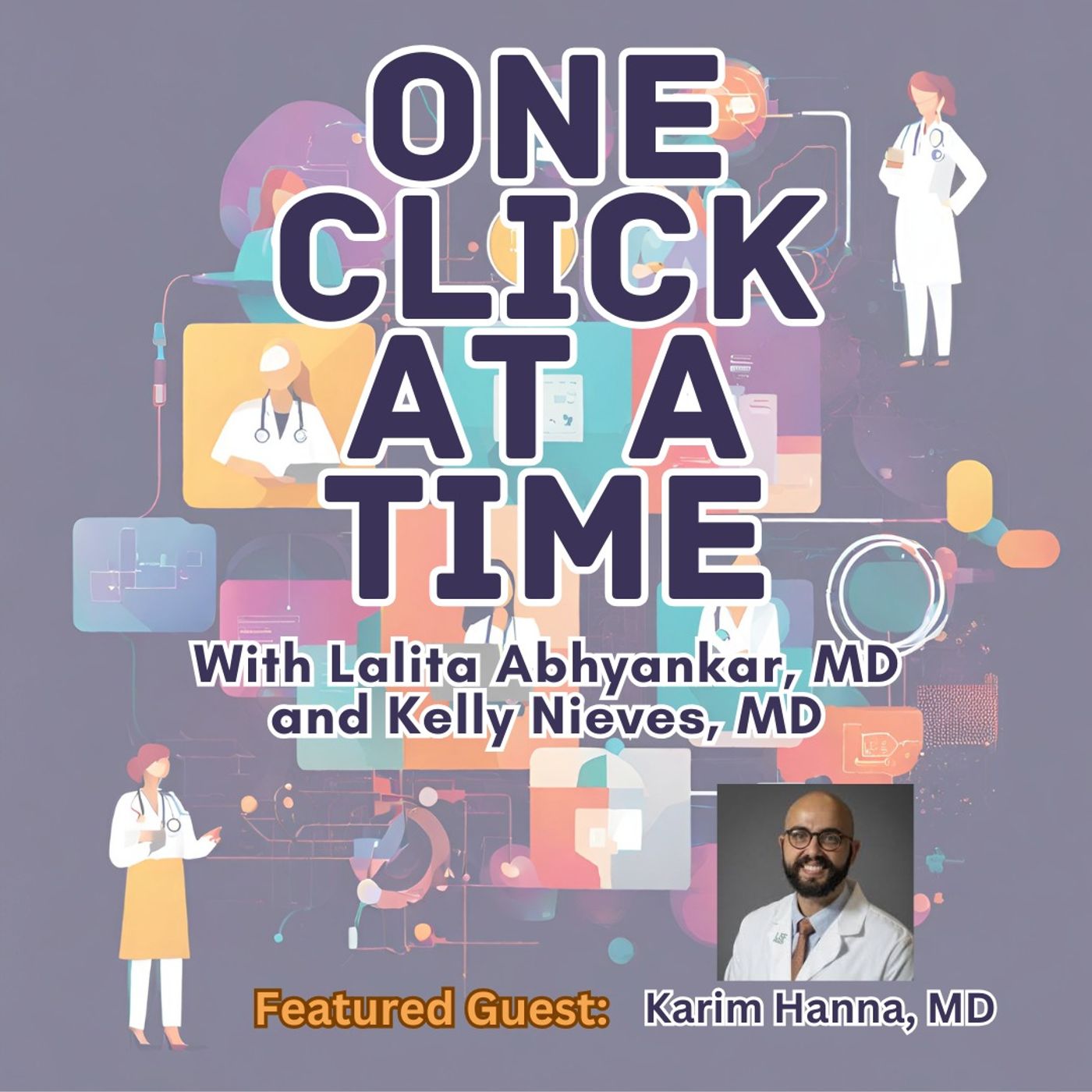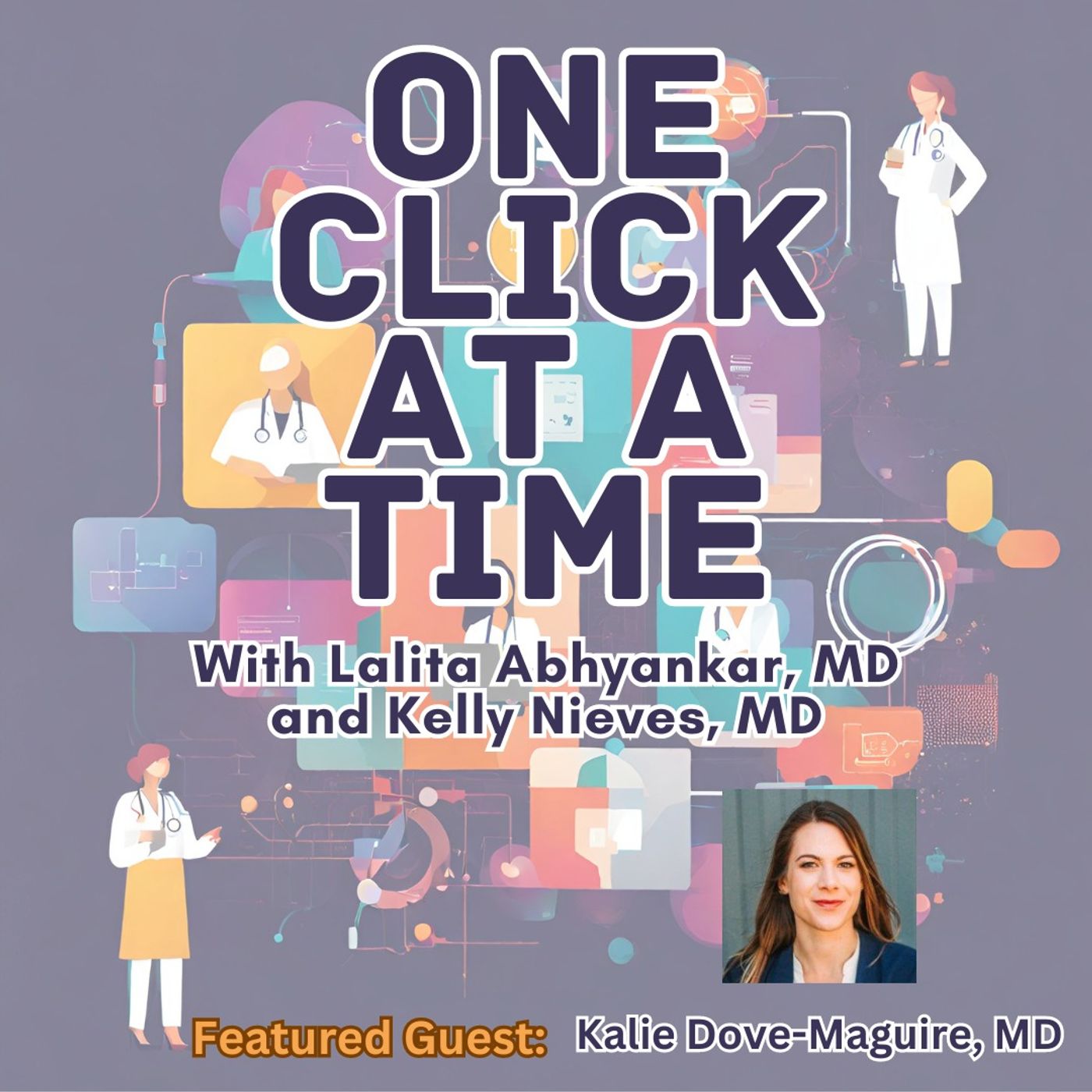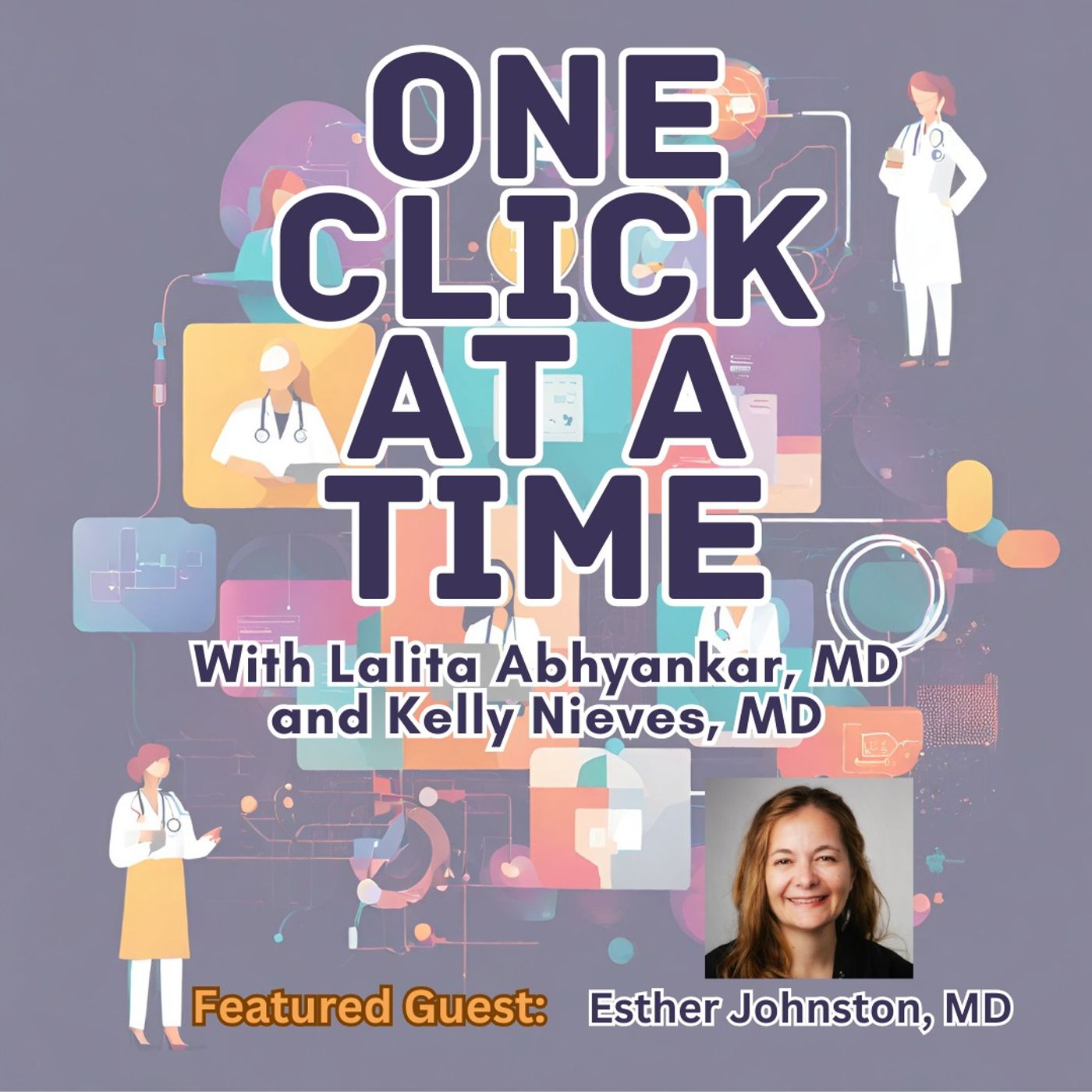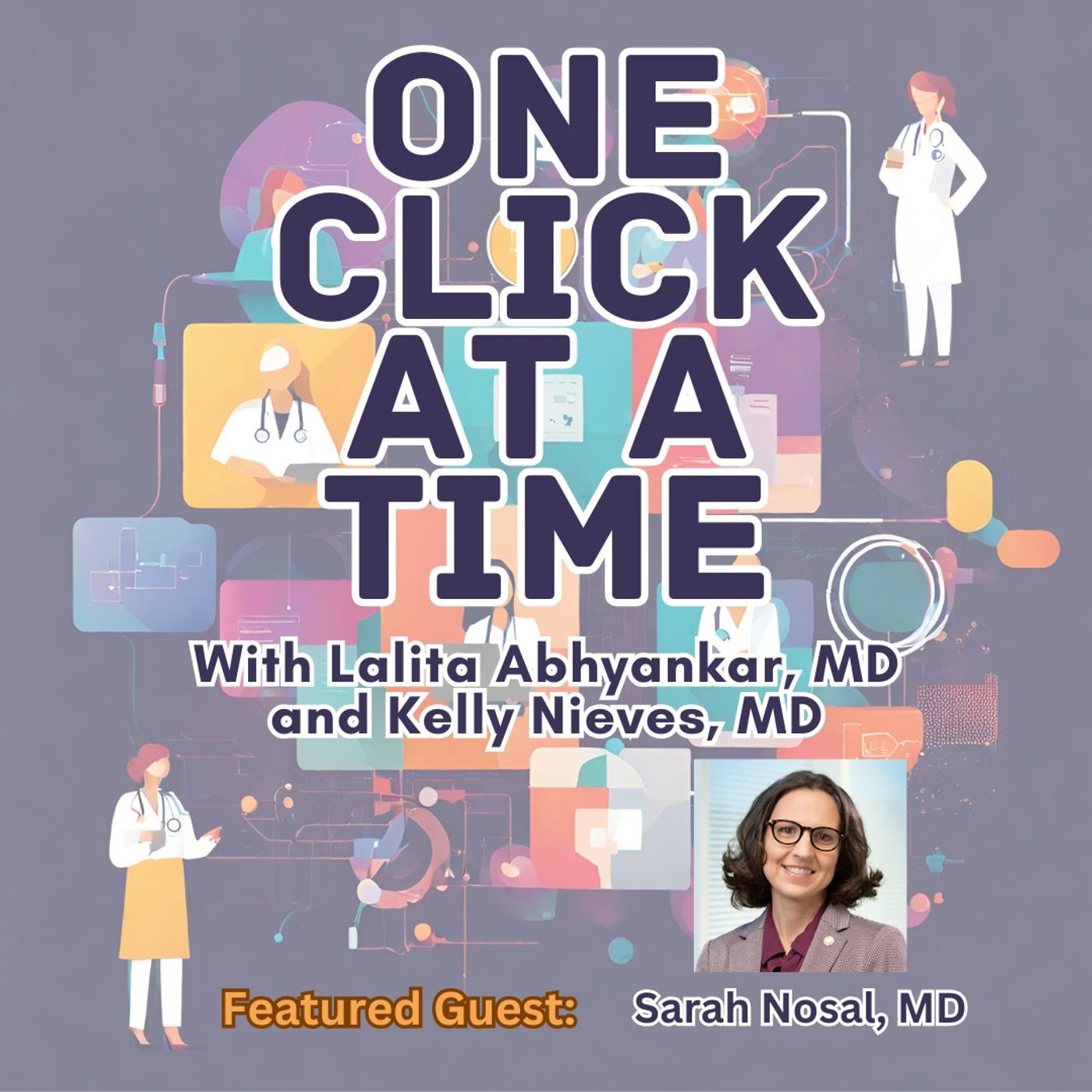Discover One Click At a Time: Technology Empowered Family Medicine Podcast
One Click At a Time: Technology Empowered Family Medicine Podcast

One Click At a Time: Technology Empowered Family Medicine Podcast
Author: Lalita Abhyankar, Kelly Nieves
Subscribed: 1Played: 15Subscribe
Share
Description
Dr. Lalita Abhyankar and Dr. Kelly Nieves are family medicine physicians and technology advocates discussing the role that technology plays in supporting the delivery of primary care. Join us as we improve family medicine one click at a time!
53 Episodes
Reverse
Dr. Steven Lin is a practicing family physician, Chief of General Primary Care at Stanford University School of Medicine, the President of the Society of Teachers of Family Medicine, and the Founding Director of the Stanford Healthcare AI Applied Research Team (HEA3RT).
In this delightful episode, Steve shares his origin story including how he came to North America and how his childhood experiences primed him for a career as an educator and community oriented family physician. Steve also shares how he got into artificial intelligence by successfully partnering with Google, and the work that he's doing with HEAR3T to actually implement AI in both inpatient and outpatient settings (spoiler alert: they're doing some pretty remarkable things!) Ultimately, he shares how family medicine is in the perfect position to have a strategic role in AI, that might just lead to an exciting new chapter for our specialty.
In their quest to learn more about AI in family medicine education, Kelly and Lalita interview Dr. Karim Hanna, an associate professor and the program director of the University of South Florida Family Medicine Residency. A clinical informaticist, Karim also writes a regular substack on AI at https://www.karimhannamd.com/.
In this thoughtful, philosophical conversation, the three discuss how clear content can help engage a new generation of family doctors in a fragmented system, as well as the role of the family physician in the age of AI, and how to make sure that we love and serve patients.
Kelly ends this episode with some incredibly poetic thoughts of her own. An episode that gave us all goosebumps and hope, it's a must listen!
In this episode, Lalita and Kelly have an expansive conversation with Dr. Anoop Raman, a family physician and the Chief Clinical Officer at AbsoluteCare, a value based care company that serves high-risk, complex patients. Anoop shares his journey from warehouse manager to working for Partners In Health in Rwanda to teaching global health at the Columbia School of Public Health, and finally to joining AbsoluteCare as CCO. He shares the concept of the "ambulatory ICU," how to find the right fit for the work, and the struggles of clinician retention post-pandemic. An interdisciplinary physician, problem-solver and educator, you won't want to miss this episode!
Kelly just got back from Epic UGM and we wanted to get the freshest of the fresh takes!
In this episode, Kelly spills her experience and her thoughts, especially now that Epic has shared everything from ambient documentation to their plans for agentic AI. Kelly talks upleveling family medicine's tech discernment skills, dedicating our speciality to innovation, and getting excited for what data stewardship can look like.
Max the Dog makes quite the excitable cameo!
Dr. Winston Liaw is a family physician and the chair of the Health Systems and Population Health Sciences department at the Tilman J. Fertitta Family College of Medicine at the University of Houston. Winston was the former director of the American Academy of Family Physician's Policy Institute: The Robert Graham Center. In this episode, Kelly, Lalita and Winston weave through his past policy research, how primary care fits into health systems and how we can effectively utilize AI to teach medical students and residents. Key takeaway: Maybe it's not as scary as we think, but we'll definitely have to adapt to a new technology healthscape. Check out the Society of Family Medicine's Artificial Intelligence and Machine Learning for Primary Care Curriculum (AiM-PC) modules: https://stfm.org/teachingresources/curriculum/aim-pc/aiml_curriculum/. If you're interested in joining Dr. Liaw's pilot, please email him at wliaw@central.uh.edu.
Dr. Kameron Matthews is a family physician and Chief Health Officer for Cityblock Health, an innovative value-based care provider that leans on technology to integrate care. In this episode, Kelly and Lalita explore Kameron's journey through medical school and law school, her leadership at the Veteran's Health Administration, and what bringing innovation beyond tradition looks like. A key lesson: just because we've always done something in a certain way doesn't mean that we have to keep doing it that way if it's not working!
In early May, Lalita and Kelly attended the Starfield Summit, a collaboration between the American Academy of Family Physicians and Rock Health, in Kansas City, MO! In this episode, they reflect on the conversation at the summit and their key takeaways on the principles that can guide AI development to support primary care with ground truths, including the 4 Cs of Primary Care (Comprehensiveness, First Contact, Coordination, and Continuity) which were inspired by research from the summit's namesake, Dr. Barbara Starfield. AI is a value-system encoded into our workflows, so how do we encode the vision of health care we wish to see? Join Lalita and Kelly to hear their takes on the intimate conversation with representatives from digital health, industry, legal, regulatory, insurance, and of course LOTS of primary care physicians.
1. Starfield Summit: www.starfieldsummit.com
2. Artificial Intelligence and Machine Learning for Primary Care Curriculum (AiM-PC). Society for Teachers of Family Medicine (STFM) https://stfm.org/teachingresources/curriculum/aim-pc/aiml_curriculum/
00:00 Introduction and Hosts
00:22 Casual Chat and Catching Up
01:04 Starfield Summit Experience
01:46 Round Table Discussions and Key Takeaways
04:02 Primary Care and AI Integration
04:38 Barbara Starfield's Legacy
06:38 Rock Health and AAFP Collaboration
07:36 AI in Primary Care: Survey Insights
10:45 Innovating for the Right Reasons
14:13 Challenges and Considerations in AI Implementation
18:25 Regulatory Concerns and Future Directions
20:07 Personal Reflections and Fulfillment
20:44 The Great Horse Manure Crisis of 1894
21:33 Healthcare Analogies and Challenges
22:05 Leveraging Family Medicine for Research
22:53 Adopting AI in Personal Practice
23:29 Clinical Decision Making with AI
24:55 AI in Knowledge Management
26:51 Ethical Considerations in AI
29:57 Future of AI in Medical Education
34:15 Concluding Thoughts and Future Topics
In April, Kelly gave a talk called "Reducing Administrative Burden for Family Physicians" to the Texas Academy of Family Physicians at their Lectureship CME series. In this episode, she shares her talk with you, our One Click At A Time listeners! Using the AAFP mnemonic "The Triple Ts: Techniques, Technologies, and Transformations," she breaks down how to organize ourselves and where we can focus our attention when targeting administrative burden, whether it is through human centered design practices, stakeholder buy in for technologies, or advocacy efforts. Definitely take a listen!
Innovation is a word that is liberally used in technology spaces. Within family medicine circles, we believe that innovation is baked in to our self-perception. Bridging that gap is like leading a diplomatic mission. In a payment landscape where family medicine is the "upstream" problem to the "downstream solution," what is the innovative role of family medicine? In this episode, Kelly and Lalita break down the innovative origins of family medicine, and dissect the role that uncertainty and full-spectrum training have played in building creativity and systems thinking within family medicine.
1. Uncertainty in Medicine: Through Thick and Thin. The Nocturnists Podcast. Apr 17, 2025. https://thenocturnists.org/podcast/through-thick-and-thin
We're taking a break for the month of April, but we still want you to meet some of our incredible friends and colleagues! In September of 2024, we chatted with Chief Product Officer extrodinaire, Kalie Dove-Maguire. Take a listen!
In this episode, Kelly and Lalita chat with a good friend of the podcast, Dr. Kalie Dove-Maguire. Kalie is an Emergency Medicine physician who is now the Chief Product Officer at Evidently, an AI-enabled chart review tool. Previously, Kalie was the Senior Director of Product at Carbon Health, where she oversaw the EHR and the rollout of AI-enabled ambient documentation.
Kalie, Lalita, and Kelly chat about career journeys, innovations in the future of health tech, and ground their conversations in the practical data and human connection.
We're taking a break for the month of April, so we thought we would repost some of our spicier takes!
This episode was originally published July 16, 2024.
"Value" based care is all the rage, but as two family docs interested in data and measurability, we're not so sure. VBC will likely increase the need for informaticists and good data queries, but are proxies dictated by payers really able to capture the value of primary care? Or is qualitative research a better way to measure the immeasurable?
In this week's episode, Kelly and Lalita speak with Dr. Marisha Burden, the division head of Hospital Medicine and a professor of medicine at the University of Colorado School of Medicine and the co-creator of the mobile platform, Gritty Work. She's an avid researcher, publisher, and thought leader on evidence-based work design and building thriving teams. With a remarkable broad research base and the curiosity to creatively address research questions on optimal teams, workplace improvements for healthcare workers, and most recently, administrative harm, Dr. Burden's mixed-methods research has the potential to impact health care design in more meaningful and financially sustainable ways. An impressive conversation, this is definitely one to check out!
Show Notes:
1. Burden M, Astik G, Auerbach A, et al. Identifying and Measuring Administrative Harms Experienced by Hospitalists and Administrative Leaders. JAMA Intern Med. 2024;184(9):1014–1023. DOI:10.1001/jamainternmed.2024.1890
2. Burden M, Dyrbye L. Evidence-Based Work Design — Bridging the Divide. NEJM. 2025;392:1044-1046. DOI: 10.1056/NEJMp2412389
Alternate title: Assessment BEFORE Plan
In this episode, Lalita and Kelly speak with Esther Johnston, MD, family physician and an Assistant Professor at the University of Minnesota North Memorial Family Medicine Residency Program. She currently serves as the Director of the Global Engagement Network for Primary Health Care (GEN-PHC), a polycentric collaborative of primary care academicians that aims to facilitate the development of educational pathways, data, policies, and programs needed to support robust, fit-for-purpose primary health care systems through partnership and collaboration.
The conversation ranges from decolonizing global health in a post-pandemic world to telehealth, broadband, and building family medicine globally, this episode explores just how similar the challenges of implementing interventions (technology or otherwise) are at home and abroad.
Links to publications mentioned in this episode:
1. King NB, Koski A. Defining global health as public health somewhereelse. BMJ Global Health 2020;5:e002172. https://gh.bmj.com/content/5/1/e002172
2. Burke G, Schellmann H. Researchers say an AI-powered transcription tool used in hospitals invents things no one ever said. AP. Oct 26, 2024. https://apnews.com/article/ai-artificial-intelligence-health-business-90020cdf5fa16c79ca2e5b6c4c9bbb14
3. Website: Global Engagement Network for Primary Health Care (GEN-PHC) https://globalhealthcenter.umn.edu/genphc
Kelly and Lalita chat with Alex Butler, MD a pediatric chief resident at Boston Children’s Hospital and Boston Medical Center, and the co-founder and Chief Product Officer of River Records, an AI-powered documentation and data summarization platform. Alex received a medical degree and a Masters in Clinical Informatics from Columbia University. In this episode, the three discuss the phenomenon of a "noteless EHR," the interface goals of River Records, the influence of Dr. Lawrence Weed on clinical documentation, and how Alex has applied his interest in technology to streamlining processes as Chief Resident. A great episode for early career physicians, our show notes also include great supplementary information for our listeners!
1. 2021 Noteless EHR Paper - https://formative.jmir.org/2021/11/e23789
2. Larry Weed's 1971 Internal Medicine Grand Rounds https://www.youtube.com/watch?v=qMsPXSMTpFI
3. Digital Health Competencies - https://jamanetwork.com/journals/jamanetworkopen/fullarticle/2829788
4. Pediatric ACGME Guidelines - https://www.acgme.org/globalassets/pfassets/programrequirements/2025-prs/320_pediatrics_2025_tcc.pdf
In this episode, Lalita and Kelly speak with Col. Brian Cahill, Chief of Soldier Primary Care and soon-to-be Chief Nursing Officer at Carl R. Darnall Army Medical Center in Fort Cavazos, Texas.
As a colonel in the army with a 20-year career in clinical and administrative leadership roles, Brian discusses his journey from bedside nursing to completing a Masters degree in Clinical Informatics at Duke University to implementing MHS Genesis as CMIO at the Army Medical Center. He delves into the challenge of integrating new technologies in healthcare settings, the importance of a strong clinical background, and the role of team-based approaches in reducing risks and improving care. Additionally, Brian touches on some noteworthy help desk tickets, showcasing real-world issues and solutions.
Join the conversation to learn how innovative approaches in technology are shaping the future of primary care, emphasizing patient safety and effective healthcare delivery.
Kelly and Lalita share their own backgrounds and how they got interested technology innovation. They also share the origin story of the podcast!
Other hot takes on this week's episode include:
- Do we actually want to work at the top of our license?
- Sometimes fun solutions are better than efficient ones
- Big picture thinking to change systems and identifying stakeholders
In this week's episode, Lalita and Kelly speak with Dr. Sara Pastoor, a DPC family physician at People-Centered Health and the Head of Primary Care Advancement at Elation Health. Sara shares her origin story of her instrumental role in shifting the military from AHLTA (the armed services EHR) to safer interfaces, all the way to Elation Health which emphasizes the importance of co-development between family physicians and design/engineering teams.
She also shares some incredible leadership advice including:
- learning how to flex the muscle of "no"
- having strong clinical skills to have an influential seat at the table
- and how to engage with stakeholders who may not be on the same page as family medicine
Jordan Chanler-Berat, MD is an Emergency Medicine physician and the founder/CEO of POCUS Preceptor, a company that supports clinical learners to learn point-of-care ultrasound later in their careers. In addition to practicing at Baystate Health, Berkshire Health Systems, and Holyoke Medical Center and teaching at ultrasound at UMass Chan Medical School, Dr. Chanler-Berat spends time as a clinical advisor for Circucare, a novel wearable cardiac ultrasound biotechnology company. In this episode, Jordan, Kelly and Lalita talk about all things POCUS: including how to get training, use cases in primary care, the value of using the tools, an artificial intelligence augmented future for imaging, and how POCUS can democratize medicine.
Dr. Sarah Nosal, MD is the president-elect of the American Academy of Family Physicians and a practicing family physician in the Bronx. In this episode, Sarah shares her journey with Lalita and Kelly from her days programming a turtle in kindergarten to becoming the Vice President for Innovation & Optimization and Chief Medical Information Officer at The Institute for Family Health, a federally qualified health center in New York. Lalita, Kelly and Sarah talk about the importance of asking for what you want, designing "user error" to still be the correct outcome, and the importance of having excellent clinical skills to have credibility in making non-clinical decisions.

















